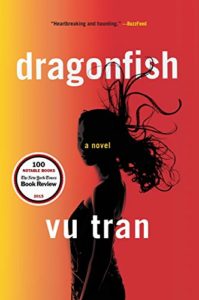Vu Tran’s novel Dragonfish combines a noir mystery with a family saga and adds a dash of ambiguity of the kind usually associated with literary fiction. Written in elegant prose, it begins as a familiar kind of detective story, the search for a missing person, but Tran seems more concerned with the mystery than its solution, with what cannot be known rather than what can.
Two husbands—or rather, three
Robert, an Oakland cop, and his ex-wife Hong a.k.a. Suzy are the story’s two first-person narrators. Hong abandons Robert for a man she met during her journey to America. Sonny has become a gambler and smuggler in Las Vegas. He’s a brutal villain but also a victim of his past. When Hong runs away from him too, he blackmails Robert into looking for her. The search leads Robert into a violent world that he doesn’t understand. The more he learns about his ex-wife, the more he realizes how little he knows her.
Not that he tries hard to know her during their marriage. He accepts her strange behavior without much caring what causes it. He calls her Suzy rather than her true name, creating a superficial American identity for her.
Her real name was Hong, which meant “pink” or “rose” in Vietnamese. But it sounded a bit piggish the way Americans pronounced it, so I suggested the name of my first girlfriend in high school . . .
It seems that Robert prefers his wife without the baggage of her past. Now, searching for her, he is forced to confront it.
Bad mother?
Hong is as much a mystery to herself as to Robert. In flashbacks she recounts her immigration to America and her deep ambivalence about motherhood. She gives birth in Vietnam while her first husband is imprisoned at a re-education camp. Although she loves her daughter, she feels alone and unable to be a good mother.
There are things that people do poorly for lack of talent, and things they do poorly for lack of desire. Then there are those things that all the desire and talent in the world cannot make fit, no matter how often you pray and how hard you pretend.
After the government releases her dying husband, he urges Hong to leave the country. She’s cast adrift on a crowded, barely seaworthy boat carrying her and her young daughter away from Vietnam. Two things that happen on the journey dramatize Hong’s ambivalence about motherhood. A woman thinks her son has fallen overboard. In a paroxysm of despair, she jumps in the ocean to drown with him. The boy is found soon afterward sleeping below deck. The woman’s devotion to her child backfires. It is extreme—and inept.
If the other mother loves her son too much, Hong fears that she may love her daughter too little.
The second incident occurs on an island where the refugees await sponsorship in America. Hong watches her daughter going into deep water, where she would likely drown, and does nothing to stop her. Hong cannot understand her own failure to act. It troubles her. These two incidents do not explain her ambivalence, but they suggest a disquieting answer—that Hong is incapable of the steadfastness and self-sacrifice that motherhood requires. She loves her daughter, yet leaves her to be raised by a relative.
Mysteries with no solution
Robert’s search for Hong brings him into conflict with Sonny and his clan, a conflict that ends in a violent resolution. But Hong remains in the shadows. She asks an ancient question—Who am I?—and cannot find an answer. Nor can the reader who wants to know how her story ends.
While the mystery of Hong’s character serves the plot and theme, the blurred edges of Robert’s character detract from the story. He’s not altogether believable as an Oakland cop, appearing remarkably untouched by a career full of stress and danger. Almost nothing is shown of his life apart from his marriage to Hong. True, the story isn’t about him, but as a major point-of-view character, he should be more fully developed.
Dragonfish does not deserve its low ratings on Amazon. Its combination of genres and ambiguous ending may explain the mixed reviews. Some readers apparently expected a more pedestrian novel. They complain that the plot moves too slowly and seem to resent the lack of resolution to Hong’s story. In another post I write about some readers’ dislike of ambiguity, a preference to which they are entitled. But plenty of other readers love Dragonfish and you can count me among them. I will not soon forget Vu Tran’s powerful novel.









